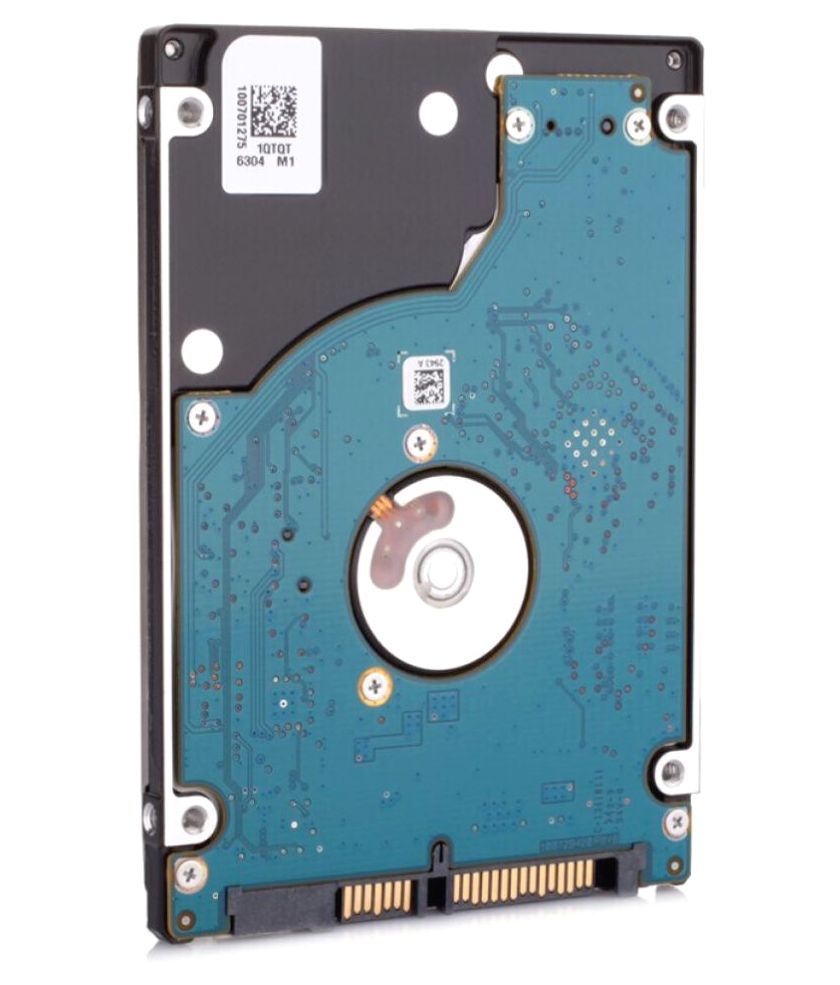For any computer to run, it needs storage space where users can install an operating system, run programs and store essential files.
That’s why all laptops require hard drives and come standard with them.
Here’s What You Need To Know About Laptops And Hard Drives
All laptops use hard drives with a 2.5-inch form factor. Anything larger won’t fit. Laptop hard drives come in both SSD and HDD formats.
These hard drives last as long as or longer than five years, provided you handle them with care. Heat, magnetic fields and hard impacts can cause them to fail. You can swap hard drives between laptops, provided both have compatible ports and connectors.
Table of Contents

Why Do Laptops Have Two Hard Drives?
Laptops have two hard drives to speed up the performance and increase the storage capacity of your device.
The operating system boots at incredible speeds and loads essential programs from your primary drive, which is usually an SSD. The secondary drive stores other user documents, files and projects.
The manufacturer often allocates boot priority to the primary drive. The secondary drive, usually a standard hard drive, has an expansive storage capacity for documents, pictures, videos and other non-system files.
What Size Hard Drive Does A Laptop Use?
All laptops use hard drives with a standard 2.5-inch form factor. However, there is no standard storage capacity. Each manufacturer will allocate different laptops with different hard drive capacities based on purpose, price, and device specifications.
For a standard Windows installation, your laptop needs a storage space of at least 32 GB.
Most hard drives have at least 160 GB of storage space, which is more than sufficient. However, where possible, opt for more storage space.
Where Is The Hard Drive In A Laptop Located?
You’ll find your laptop hard drive attached to the motherboard of your device underneath the keyboard. Different brands have different locations for hard drives, but in principle, they’re all inside your laptop chassis, attached to your laptop motherboard.
Some laptop brands install hard drives opposite to the CD/DVD drive.
Other laptops without CD/DVD drives may configure their motherboards differently, placing hard drives elsewhere. It all depends on your laptop brand.
How Long Do Laptops Hard Drives Last?
On average, most laptop hard drives last for at least 3 to 5 years. It may be longer or shorter depending on the quality and brand of your hard drive. Besides that, handling also plays a role in the lifespan of your hard drive.
Dropping your laptop or exposing it to magnetic fields or heavy impact forces can decimate the lifespan of your hard drive, leading to extensive data loss.
To get more life out of your drive, avoid dropping your laptop or exposing it to potential impact or magnetic forces.
Keep your hard drive at temperatures between 77°F and 113°F. Extreme heat or cold temperatures damage hard drive platters, causing temporary or permanent loss of data because of failure.
What Happens If I Remove The Hard Drive From My Laptop?
It depends on when and how you do it. Also, removing a hard drive from your laptop on purpose is okay if you take caution while doing so.
Attempting to remove your hard drive while the laptop is still running, bears several risks. First is the risk of electric shock to you, especially if you’ve connected your laptop to an external power supply.
Second, abruptly ejecting a running hard drive may cause your hard drive to fail, and you’ll lose part or all of your data. As a result, other parts of your laptop may fail because of static shock.
However, if your device is off, disconnected from its battery and any external power source, you can safely remove its hard drive. You can also replace it or move it to another compatible port on your motherboard.
A hard drive is a key determinant of the functionality of your laptop. If it’s your primary drive, put it back as it contains all your device files, including the OS. Without it, you’ll only access the BIOS but that’s all you’ll get.
If you ever have to remove your hard drive from your laptop, ensure you take these precautions:
- Gain the skill and knowledge needed to remove your hard drive.
- Do it on a clean, dry, flat and stable surface, somewhere safe for your hard drive. Ensure you don’t lose any tiny screws.
- Use the right set of screwdrivers and other tools to get past the screws and chassis.
Does Removing A Hard Drive Delete Everything?
There’s little to no risk of data loss if you remove it with care. Improper removal poses the risk of partial or complete data loss.
Most times, your hard drive will still function properly even after several removals.
Do External Hard Drives Work With Laptops?
All modern laptops work with external hard drives. Some hard drives act as extended storage devices while others offer alternative booting options.
Otherwise, any laptops that support USB, FireWire or Thunderbolt connectivity will easily connect to an external hard drive.
Can I Swap Hard Drives Between Laptops?
You can swap a standard 2.5-inch hard drive from one laptop to another, provided both hard drive ports are identical.
Swapping hard drives between laptops will not affect the content inside them. Also, If one laptop contains a hard drive with an operating system, any additional HDD becomes secondary.
Be careful to choose which drive to boot from to avoid mishaps. You can change your boot drive in your computer BIOS software. Also, you can format the secondary HDD and use it as a storage drive instead.
Be certain that both hard drives are functional before swapping them between laptops.
Why Do Apple Laptops Have A Small Hard Drive?
Apple laptops don’t need large hard drives as they’re designed for light office work and basic media use. Macs are also a favorite device for developers because they’re compact and lightweight, perfect for remote work and portability.
Many modern Apple laptops come with SSDs which have slim and compact form factors. Although compact, these drives have expansive storage capacities.
Also, Apple sells iCloud services as an extension of their devices. With this cloud storage product, mac users can access essential documents and files remotely, eliminating any need for more hard drive storage.
Why Do Gaming Laptops Have A Small Hard Drive?
Although the primary drives of gaming laptops have small form factors and limited storage capacities, they’ll boot any operating system at blinding speeds. Also, gaming laptops rarely come with only one hard drive.
In principle, the primary hard drive, usually an SSD, only boots the OS and essential programs. Secondary drives on gaming laptops usually come with expansive storage capabilities that exceed even professional laptops. Here, you can store all your games and video-editing projects without worry.
Besides that, online gaming and cloud storage services play a key role in small hard drive sizes.
Many gamers will buy laptops with an SSD to ease lags during streaming. Where a gaming computer only has one SSD, it will often have an extensive capacity for all your gaming needs.
What Should I Look For When Buying A Hard Drive?
Depending on your needs and availability of options, here are some things to consider before making a purchase:
HDD or SSD
Both drives will perform the same functions, but their differences narrow down to their benefits and drawbacks.
While SSDs are faster, use less power and make less noise, they cost exponentially more than HDDs. HDDs have larger storage capabilities and are cheaper than SSDs. However, they’re slow and consume more power.
If you are a speed freak, go for an SSD. If you’re interested in storing more data, go for an HDD. Where possible, get both. Set your SSD as the primary boot drive and an HDD as the secondary drive.
Size and Interfaces
All laptops use hard drives with a 2.5-inch form factor. Ensure you pick one that fits your laptop. Anything larger and it won’t fit into your laptop.
Also, consider the connectors. If your hard drive uses a different connector from your laptop’s interface, it won’t work. You may need to purchase a converter or replace it with a compatible one.
Specifications
Each hard drive has its own capabilities, and you should check them out before deciding.
Transfer Speeds
With transfer speeds, faster is always better. A hard drive with transfer speeds of up to 7200 RPM is superior to one with speeds of up to 5400 RPM hard drive.
Storage Capacity
Purchase a hard drive that meets your storage needs. At the time of this writing, HDDs can store up to 20TB of data while SSD can score upwards of 8TB on a single drive.
Sustained Read and Write Speeds and Access Times
Where possible, always pick drives with higher read and write speeds. Sustained read and write speeds determine how fast your SSD will be.
Rate of failure
SSDs last longer than HDDs because they have fewer moving parts and can withstand impacts better.
Prices
According to the cost of storage per gigabyte measure, SSDs attract heftier prices than standard HDDs. Also, some hard drives and SSD brands cost more than others. This is partly because of quality and brand tax.
External or Internal State
External hard drives have different capabilities from internal drives. They also have varying transfer speeds, builds and pricing. You can use either HDDs or SSDs for both purposes.
Final Thoughts
You can always upgrade your laptop hard drives to something with more capacity or better speeds.
If your laptop has two ports, always have the faster drive as your primary boot device. Doing this ensures your laptop always runs at optimal speeds.
Sources
https://www.makeuseof.com/tag/5-things-need-consider-buying-hard-drive/
https://smallbusiness.chron.com/effects-removing-laptops-hard-drive-72581.html
https://www.prosofteng.com/blog/how-long-do-hard-drives-last
